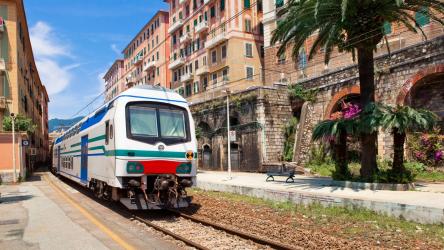

Environmentally friendly, cheap, convenient, comfortable, and fast: the train is our favorite mean of transportation to travel through Italy.
You may have never thought of using the railway as a preferred way to reach your holiday destination or travel from one destination to the next – but that is what a lot of Italians do! A much more convenient alternative to the trafficked highways and tiny car compartment, Italian trains run on a rail system covering almost 17.000 km, with 1000 (plus 370 in the work) dedicated to high-speed trains: such an extended railway network allows to travel through the whole country safely and speedily.
If you’ve travelled with us before, you’ve probably noticed that your travel documents always include step-by-step instructions on how to reach the start of your trip and depart from the final destination using trains and public transportation.
We do this intentionally, because we actively encourage train travel more than any other transport option.
It’s sustainable, practical, and fully aligned with the meaning of slow travel.
Reaching your destination by train sets the right rhythm: lighter, calmer, and more connected to the landscape. That’s why we always provide recommended routes, approximate schedules, bus connections, and alternatives when trains aren’t available — to make it simple and stress-free.
A train journey is not just transportation: it is a space of transition, a gentle pause.
It is the moment when you can:
The journey truly begins on the rails.
Reasons to travel by train:
A few reasons to travel by train:
Compared to planes and cars, trains are the most environmentally friendly mode of motorized transportation in Europe: greenhouse gas emissions per passenger kilometre for rail transport is up to five times less than that of car transport!
Trains are very cheap in Italy: to give you a few examples, a ticket from Florence to Lucca (a 1 hour 30-minute ride) costs around 8 Euros! A short ride (around 20/30 minutes) on a regional train does not usually cost more than 3 Euros. High speed, long-distance train will obviously cost more, but a ticket from Florence to Rome (a 2-hour ride) booked reasonable in advance will cost you less than 30 Euros. By monitoring and taking advantage of the frequent special offers, you may snag one at less than 15 Euros!
Here are a few examples of prices (per person, one way)and travel times for some of the trips you may plan - variation in price depends on the type of train (see below). Prices for high-speed trains are an estimate based on standard class.
Pisa Airport to Lucca or Fucecchio to start Tuscan Via Francigena:travel time from 47 to 55 minutes, 8,70 Euros (9,80 to Fucecchio)
Siena to Pisa Airport: 2 – 2.5 hours, 16,20 Euros
Rome Fiumicino to Assisi for the Saint Frances Route: From 2.5 hours to 3.5 hours, from 25 to 38 Euros
Bari Apt to Lecce for the Coastal Puglia: 2.5 hrs, from 16 to 28 Euros
Milan – Rome: 3 hrs 15 minutes / 3 hrs 40 minutes, 40 Euros
Rome – Venice: 4 hrs, 40 Euros
Naples – Bari: 4 hours, 18 Euros (regional Naples Caserta + High Speed Train to Naples)
Trains are very frequent – both regional and high-speed trains run regularly, with an average of 3 departures per hour for most lines.
Train stations are usually located in the center of the villages or main cities, making train travelling very convenient as you can reach the city center with no need to take Airport shuttles or leave the hotel hours in advance to go through Airport security. You can just plan departure time from the hotel depending on the time needed to reach the train station, and comfortably reach your next destination.
Trains do not require any limitation on the amount of luggage you are going to carry, making it way easier (and less stressful) than flying: just consider than you may need to leave bigger bags in the compartment between the carriages, which may require some extra caution to make sure they are not stolen when the train stops.
You can get special discounts on regional trains thanks to your Via Francigena credential, 10% decrease on the price of the ticket – valid for both physical and online purchase. More information here https://www.viefrancigene.org/en/trenitalia-en/
Trains in Italy: how to they differ?
Finally, a few notes on the different types of train in Italy: if you travel within the same region, you will mostly use regional trains (TreniRegionali) or Inter-regional Trains (InteRegionale), while if you need to travel long distance you will need to look for Frecce, Italo Trains, or InterCity trains.
Regionali e Interregionali do not need to be booked, the ticket does not need to be stamped (if purchased online, you may need to do so if you buy them at the ticket office) and your ticket will usually be valid for up to 4 hours from the time written on the ticket (check validity depending on the distance you need to travel, as it varies based on the number of kilometers covered)
High-speed, long-distance trains need to be pre-booked and the ticket is only valid for the time and date purchased.
You can find detailed information on the different types of trains here: https://www.italiarail.com/types-trains
In conclusion…
Travelling by train means embracing the spirit of slow travel before your journey even begins.
It is sustainable, scenic, comfortable — and deeply Italian.
And perhaps, on your next adventure, the rhythm of your journey will start not on a trail… but on a platform.